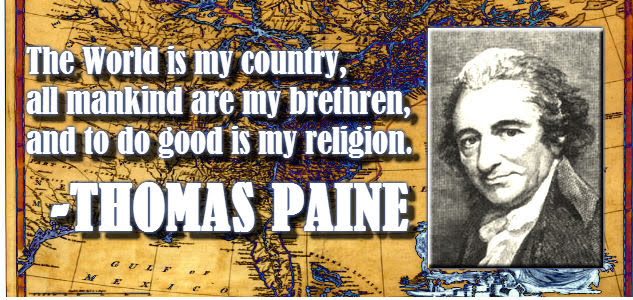 Thomas Paine is the founder of modern democracy. In word and deed, he crafted the democratic movement in three countries, and it spread on its own around the world.
Thomas Paine is the founder of modern democracy. In word and deed, he crafted the democratic movement in three countries, and it spread on its own around the world.
As a result, he was attacked and marginalized for 200 years, slandered, a victim of the largest dis-information campaign in history. His image and words were actually banned, right up to and including the McCarthy era in America when his books were banned, even the fictional accounts like Citizen Paine by Fast. The pre-eminent founder of America was not recognized as such for literally centuries. But as Paine said, “But such is the irresistible nature of truth, that all it asks, and all it wants, is the liberty of appearing.”
The Thomas Paine National Historical Association was founded to correct this situation. In 1884 in New York City, dozens of leaders of the progressive era came together under this organization to use Paine as the symbol of democratic rights and government. Suffragists, civil rights, free speech, anti-clerical, socialists, anti-monopolists, anti-imperialist, women’s health rights, and more. An organization with Paine’s name on it must have the soul of Paine as it’s engine.
The origin of modern democracy is Common Sense, Paine’s call for revolution against British rule, and in particular, against monarchy itself. No other Whig (the name of progressive leaning political figures back then) endorsed this qualitative leap of ending monarchical government. Paine started it and popularized it among the people. He then followed up with Rights of Man which became the bible of the Age of Democratic Revolution. We cannot discuss the roots and ideology of democracy without Thomas Paine.
Paine is the Democratic Manifesto, his life and works. In 1777, in Philadelphia, in the heat of defeating not only Britain, but also the American Tories, he formed the Whig Society, the first revolutionary party in the world. He followed that up in Paris, in 1791, with the Social Circle, the second revolutionary party in the world. He helped craft the first two truly democratic constitutions in Philadelphia and Paris, the first lasted 14 years before conforming to the new oligarch structures in America, and the second was never implemented due to the counter-revolution in France in 1795. It is worth studying those documents to find the origins of the struggle today.
Do not be confused by the antiquated structures called “democracy” from ancient Greece, where every landed elite sat together and made laws as slaves served them food and drink. Modern democracy could not emerge until the Enlightenment took root, and the political theory of Paine was deeply rooted in it. The emerging new classes coming out of the Dark Ages would contend for dominance. Paine stood with the lower classes where he came from, and never wavered. The very word “democracy”, as we use it today, originated with Paine’s Rights of Man. Before that, “democracy” only referred to the Greek elite government situation described above. But in a way it is still often used in that context today, when we hear oligarchs using it to defend their privileges, while the majority still languishes in need.
Part II will be on the structures of Paine’s democracy.
David Anderson says
Paine is probably the most underrated of all the greats.
D.A.